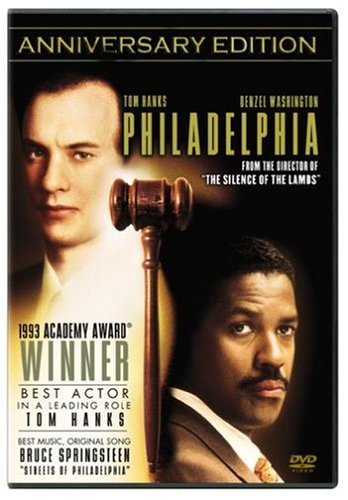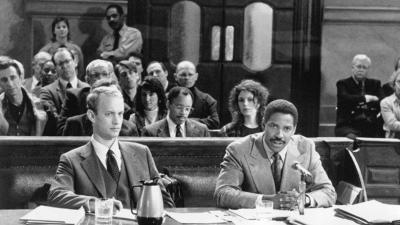This year marks 20 years since the release of the ground-breaking movie, Philadelphia,one of the first Hollywood films to explicitly address HIV/AIDS, homosexuality, and homophobia. Even after 20 years, it’s difficult to think of a movie that had a morehumanizing and positive effect in changing perceptions of people with HIV/AIDS.
At the same time, Philadelphia was both a critical and box-office success. Tom Hanks won his first Academy Award for Best Actor and the song “Streets of Philadelphia” by Bruce Springsteenwon the Academy Award for Best Original Song. Hanks also received a Golden Globe Award for best actor in a dramatic film. Ron Nyswaner was also nominated for the Academy Award for Best Original Screenplay.
Here at ActionAIDS, we have a very special connection to the movie Philadelphia, and this anniversary has brought back memories of that time. As our Executive Director Kevin J. Burns, who was then Assistant Director of Client Services, recalls, “The movie Philadelphiadocumented a time in the history of HIV disease that was very difficult and much different from today. We must always remember that the progress we have achieved came at a great cost. The movie and the anniversary are an opportunity to do just that.”
One connection we have with Philadelphia is that our offices on Arch Street were one of the many locations in Philadelphia used in the film. Watch the beginning of the movie closely and you’ll see the lawyer Andrew Beckett, played by Tom Hanks, walk in the front door of our building at 1216 Arch Street. It turns out that he’s on his way to see his doctor, and the doctor’s office scene was also filmed here at our offices. “Although it’s a short scene,” recalls Jean-Marie Zippo, who still works at ActionAIDS and was then a case manager, said, “they were here all day.” The ActionAIDS staff was captivated with having a major motion picture, starring the likes of Tom Hanks and Denzel Washington, filmed on the premises.
The director of Philadelphia, Jonathan Demme, not only selected our office for one of the scenes, he also featured more than 50 ActionAIDS clients as extras in the movie. Making this possible was our way of directly addressing the stigma and isolation experienced by people with AIDS. One such novice actor, Mark Sorensen, appears briefly in the waiting room in that scene at the doctor’s office. In September 1993, knowing that Mark was in the final stages of AIDS while the movie was being scored, Demme arranged for an unedited videotape of the movie to be rushed to Mark at his parents’ home where he was staying during his illness. Mark did get to watch the movie with his family – before he died next day.
Since 1993, so much has changed. Most notably for our clients at ActionAIDS, new anti-retroviral drugs became available several years after the movie. Now, those medications make a huge difference. As Jean-Marie Zippo recalls the time period depicted in the movie, “Back then, my wardrobe choices had to pass the ‘funeral test.’ Now, I have more red in my wardrobe. Now if a client dies, it’s because of some other co-morbidity, not HIV.” Our case managers, such as Jean-Marie, make sure our clients remain in medical care for HIV, which now prolongs and enhances their lives. A nd as our clients in treatment maintain low or non-detectible viral loads, we reduce or eliminate the risk of HIV transmission to others. This is a key element in our mission of creating the first AIDS-free generation – something that was only a hope back then, not the reality it is today.
nd as our clients in treatment maintain low or non-detectible viral loads, we reduce or eliminate the risk of HIV transmission to others. This is a key element in our mission of creating the first AIDS-free generation – something that was only a hope back then, not the reality it is today.
After Mark Sorensen’s death, Tom Hanks acknowledged him in his Golden Globe Award acceptance speech, saying that he was lucky “to have experienced the good-will and been in the presence of awe-inspiring inspiring people such as … a young man named Mark Sorensen … who was not wearing any makeup but was obviously in the midst of a system-wide battle of his immune system with the AIDS virus. The last time I saw Mark Sorensen, he was filling out his time card for his day’s work on the motion picture. I will never forget him and I will never forget the experience of working on such a movie at such as time.”
We won’t forget Mark either, nor will we forget all the other clients with AIDS that we’ve served over the past 20 years, and will continue to serve as long as we’re needed.
For more coverage of the anniversary of the movie, check out Elana Gordon’s story on WHYY-FM’s The Pulse, which includes interviews with ActionAIDS current and former executive directors as well as many others involved in fighting AIDS in the early 1990s.
– David W. Webber, J.D., Senior Development Specialist, ActionAIDS

